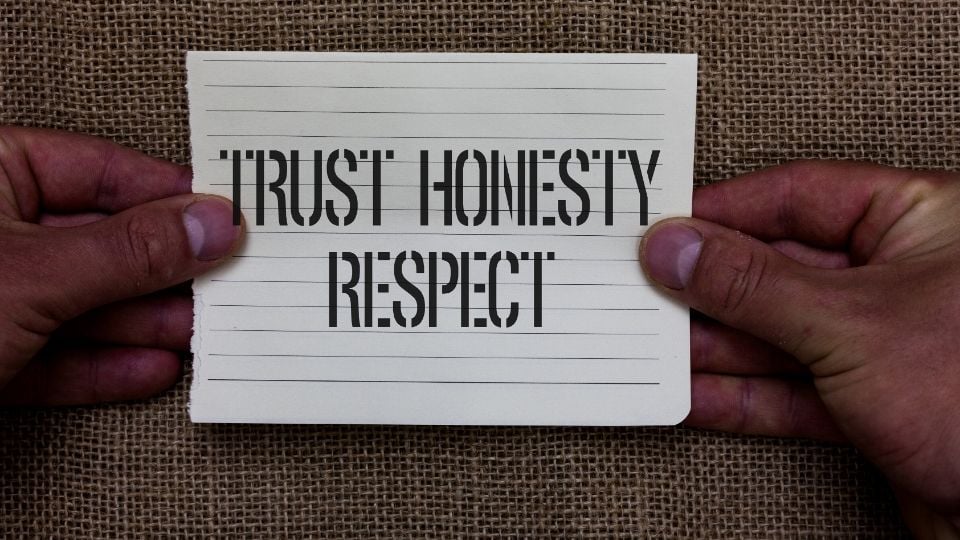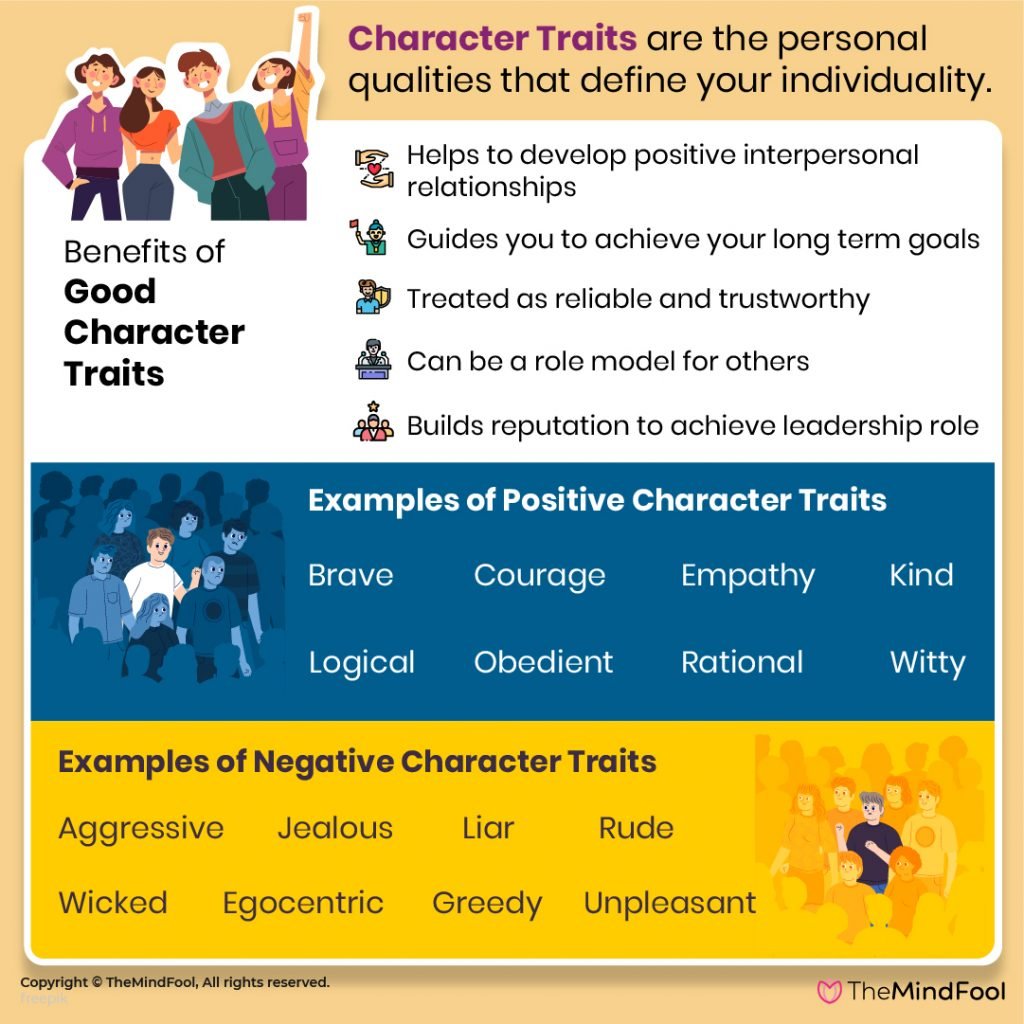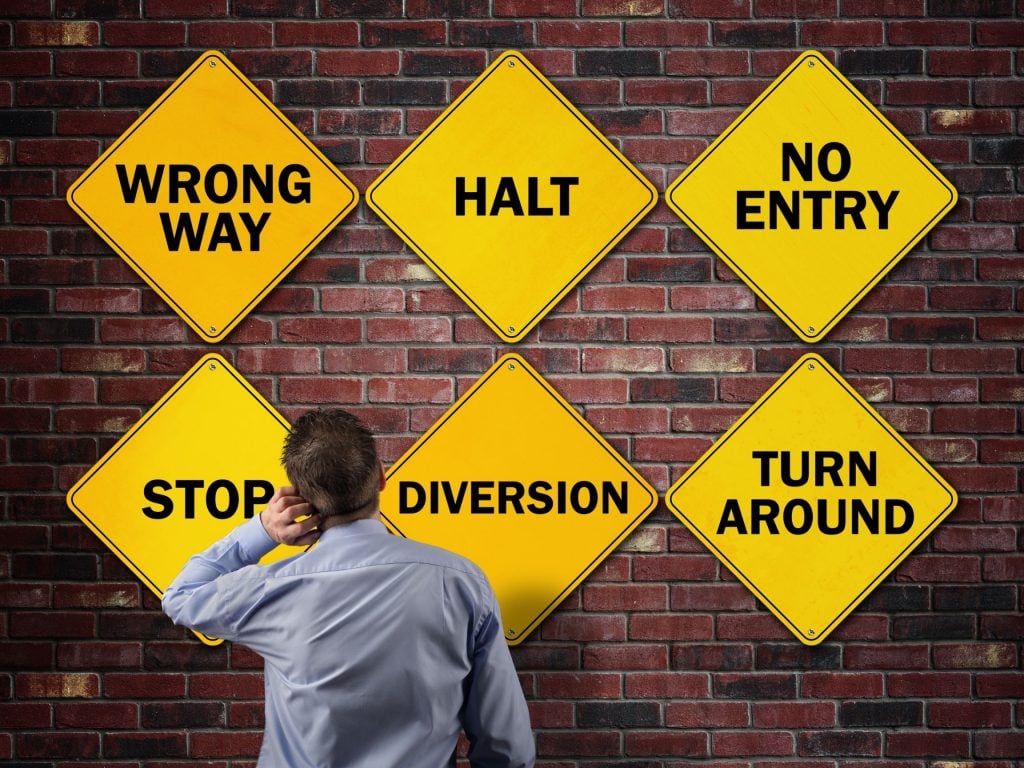
An individual is judged by his or her behavior in our society. Behavior is the outward manifestation of our values and core character traits.
These are labels that use personality adjectives to describe the nature of the person. These are deep-rooted qualities that develop over time and become a guiding principle for life.
What are Character Traits?
SUMMARY
The personal qualities that define your individuality are your character traits.
Character traits are the psychological and moral qualities that are distinctive of an individual. It determines ‘how’ you are.
These are the most priced and valued aspects of yourself that either get acclaimed or rejected by the society in which you live.
Everyone has character traits. Some are good and others are not. The good character traits are those that are liked and approved by others around us. The not so good traits are either disliked or rebuked by others.
Thus, your character traits explain those qualities that make you the person into the type of person you are. Character traits and personality traits are related concepts, but they are not the same.
Character traits are determined by ethical values and beliefs that bring in the difference between two persons.
Personality traits are a combination of one’s attitudes, values, and behavior that gets manifested in social situations.
Character Traits Definition
Character traits are defined as those notable characteristics of a person that are typical of his or her nature. These are inherent values that don’t change much with time and situation. it represents the way you behave consistently, even when alone.

Concept & Examples of Positive Character Traits
The traits that are liked, approved, and valued by others are your positive character traits. Few simple examples are kindness, honesty, optimism, generosity, bravery, etc. if you have positive traits, you can easily attract others.
Your amicable nature will help you to develop good relations in personal and professional life. You are admired and loved by others.
Positive character traits are strengths that help to fine-tune your personality in desirable ways. These are assets that influence your attitude and behavior in significant ways.
Concept & Examples Negative Character Traits
Your negative character traits refer to those aspects of yourself that are not liked by others.
These negative qualities are your shortcomings. These are considered bad or negative in social settings. You need to work on these traits to develop a good personality.
To attain success, you will have to remove these weaknesses. Few examples of negative traits are selfish, coward, dishonest, deceitful, etc. negative traits make you a pessimistic being. It makes you narrow, superficial, and unreliable.
Importance of Character Traits
Your character traits refer to all those viable features that make you prominent. These are inherent attributes that differentiate you from others. People having favorable traits can easily receive admiration from others.
Your character is a social construct. It is formed by continuous adherence to social norms and moral values. Your character traits get a count in all spheres of life.
The importance of character traits are
- Character is the building block of your personality.
- Positive traits are a symbol of trust, admiration, and leadership. You are liked and accepted by the people around you.
- Since these traits are based on ethics and values, it makes you firm, confident, and positive in your outlook and behavior.
- You can motivate and persuade others easily because of your attractive demeanor.
- Good character traits help you to empathize with others. It makes you more supportive and less judgmental.
- It helps you to make productive decisions. You are adaptable and open to accept situations as they are.
- You can have a charming and appealing personality.
- It defines your innate nature and value system, thus affecting the choices you make in your life.
Character Traits List
200 Positive Character Traits
A list of traits is as follows
- Accessible- Approachable
- Active – Energetic
- Adaptable – Can adjust to new situations.
- Adaptable- Flexible and adjustable
- Adventurous- Daring, fearless
- Affable- friendly
- Affectionate- Warm-hearted
- Agreeable – Pleasing and likable
- Alert – Vigilant
- Ambitious – Determined
- Amicable – Good nature
- Amusing – Jolly
- Articulate – Eloquent
- Attentive – Focused
- Austere – Good manners
- Balanced – Fair, just
- Benevolent- Kind-hearted
- Brave- Courageous
- Bold – Daring
- Bright – Intelligent
- Brilliant – Talented
- Broad-minded- Open to things
- Capable – Competent
- Careful- Cautious
- Caring- Concern for others
- Charismatic – Attractive
- Charitable – Generous
- Charming- Pleasant and attractive
- Clever – Bright and quick to understand
- Compassionate – kind
- Confident- Sure of oneself
- Considerate – Understanding
- Cooperative – Helpful
- Courteous- Well-mannered
- Creative – Develop new things
- Curious – Eager to know things
- Daring- Fearless
- Debonair – Stylish and charming
- Decent- Good enough
- Decisive – Plays a significant role
- Dedicated – Devoted to a task
- Dependable – Trusted
- Determined – Resolute
- Dignified – Noble and serious
- Diligent- Hardworking and persistent
- Disciplined – Follows rules
- Discreet – Cautious
- Dutiful – Devoted
- Dynamic – Energetic
- Easy-going- Carefree and relaxed
- Efficient – Methodical and systematic
- Elegant – Graceful
- Eloquent- Fluent and persuasive
- Empathetic- Feels for others
- Encouraging – Positive and hopeful
- Energetic – Dynamic
- Enthusiastic – Eager in doing things
- Excellent – Extremely good
- Exuberant – Full of energy
- Fair- Impartial
- Faithful- loyal
- Fearless – Bold, brave
- Firm – hard and stiff in values
- Flexible – Adaptable
- Focused – Attentive
- Forgiving- Merciful
- Frank – Candid
- Friendly- Kind and pleasant
- Frugal – Economical
- Funny – Humorous
- Generous – Kind
- Gentle – Mild temperament
- Genuine – Authentic
- Gracious- Courteous
- Gregarious – Sociable
- Gritty – Brave
- Hardworking- Energetic
- Helpful- Obliging and kind
- Heroic – Courageous
- Honest- Truthful
- Honorable – Respected
- Hopeful – Optimistic
- Humble – modest
- Humane – Compassionate and kind
- Humorous- Fun loving
- Idealistic – Visionary
- Imaginative – Creative and insightful
- Impartial – Unbiased
- Incisive – Sharp and clear thinking
- Independent – Can do things without help
- Industrious – Diligent
- Initiative – Enterprising
- Innovative- Original and pioneering
- Insightful – Inventive
- Intelligent – bright and sharp
- Intuitive- Good reasoning ability
- Inventive – Innovative
- Jovial- Happy and cheerful
- Just – Fair-Minded
- Keen – eager to do things
- Kind- Caring and helpful
- Liberal- Open to new ideas
- Listening – Attentive
- Lively – Jovial
- Logical- Objective and insightful
- Lovable – Charming
- Loyal- Faithful
- Magnanimous – Generous
- Mature – Full-grown abilities
- Methodical – Systematic
- Meticulous- Precise and particular
- Mindful – Aware of things
- Moderate – Average
- Modest- Fair and tolerable
- Neat- Organized and tidy
- Obedient – Comply with others
- Objective – Impartial
- Optimistic – Positive outlook
- Orderly- Well-organized
- Organized – Systematic
- Original – Genuine
- Passionate – Intense
- Patient- Tolerant and understanding
- Peaceful – Calmness
- Perfectionist – Idealist
- Persistent – Determined
- Persuasive – Convincing
- Placid – Even-tempered
- Playful – Amusing
- Polished – Bright
- Polite – Well-mannered
- Powerful – Strong
- Practical – Pragmatic
- Pragmatic – Realistic
- Precise – Exact and accurate
- Principled – Guided by moral values
- Protective – safeguarding others
- Prudent – Wise
- Punctual – On-time always
- Purposeful – Determined
- Quiet- Silent
- Rational- Logical and clear ideas
- Relaxed – Free from tension
- Reliable- Trustworthy
- Reserved – Reveal emotions slowly
- Resolute – Purposeful
- Resourceful – Sharp, Inventive
- Responsible – Accountable
- Responsive – Reacts quickly
- Righteous – Honest
- Romantic – Passionate, Intimate
- Rustic – Simple and homely
- Secure – Dependable
- Self-confident – Trust on oneself
- Self-disciplined- Mastery of oneself
- Selfless – Unselfish
- Self-sufficient – Depends on oneself
- Sensitive – Careful and tactful
- Silent – Quiet
- Simple – Straightforward
- Sincere – Honest and genuine
- Skillful – Gifted
- Sober – Serious
- Sociable – Affable
- Spontaneous – Voluntary
- Sporting – Lively
- Stable – Steady
- Steadfast – Committed
- Stoic – Endures pain and hardships without complaint
- Straightforward – Uncomplicated
- Strong – Powerful
- Suave – Charming
- Subtle – Nice and fine
- Supportive – Helpful
- Sympathetic – Expressing concern for others
- Temperate – Mild nature
- Thoughtful – pensive
- Thrifty – Uses resources carefully
- Tidy- Neat and clean
- Tolerant- Understanding and patient
- Tough – Strong
- Trustworthy – Dependable
- Truthful – Honest
- Unassuming – Modest
- Uncomplaining – Resigned
- Understanding- Sensitive and compassionate
- Undogmatic – Freethinker
- Unselfish – Altruistic
- Upright – Honest
- Valiant – Brave
- Versatile- Flexible and multi-talented
- Virtuous – having moral values
- Vital – Active
- Vivacious – Lively
- Warm – Friendly
- Well-rounded – Master of many skills
- Willing – Ready or prepared
- Wise- Learned and Insightful
- Witty- Funny and Amusing
- Youthful – Active and young
200 Negative Character Traits
A list of character traits not considered worthy in our society are:
- Abrasive – Harsh
- Adamant – Stubborn
- Addictive – Susceptible to depend on something
- Aggressive-Hostile and violent
- Aimless – Without purpose
- Antisocial – Offensive
- Apathetic – Indifferent and detached
- Arbitrary – Whimsical
- Argumentative – Given to arguing
- Arrogant – Feeling superior of oneself
- Belligerent – hostile
- Bewildered-Confused, puzzled
- Bizarre – Odd, peculiar
- Bland – Dull and boring
- Blunt – Unsharpened
- Boorish – Rough and bad manners
- Boring – Dull
- Bossy – Dominating
- Brutal – Cruel and violent
- Callous – Lack of care and insensitive
- Caustic – Sarcastic
- Charmless – Unattractive
- Clingy – Inseparable
- Clumsy – Awkward
- Coarse – Rough
- Complacent – Proud of oneself
- Compulsive – uncontrollable
- Conceited – Proud of oneself
- Coward – Not brave and bold
- Crazy – Out of one’s mind
- Critical – Criticize others
- Crude – Coarse and rough
- Cruel – Harsh, rude
- Cunning – With wicked intentions
- Cynical – Self-interested, selfish
- Deceitful – Dishonest, false
- Demanding – Nagging
- Desperate – Anguished
- Detached – Disconnected
- Discontented – Dissatisfied
- Discouraging – Depressing
- Disloyal – Unfaithful
- Disobedient – Do not obey others
- Disorganized – Unsystematic
- Disruptive – Troublesome
- Distractible – Inattentive
- Dominating – Rules others
- Egocentric – Thinks only of oneself
- Enervated – Lack of energy
- Envious-Jealous
- Erratic-Inconsistent, uncertain
- Evasive – Avoid commitment
- Evil – Wicked
- Extravagant – Spendthrift
- Facetious – Waggish
- Fanatical – Bigoted
- Fawning – Gets irritated quickly
- Fickle – Changes frequently, not stable
- Fierce – Angry
- Finicky – Fussy
- Flaky – Acts in an unconventional way
- Flamboyant – Extravagant
- Flippant – Carefree
- Foolish – Silly
- Forgetful – Absent-minded
- Fraudulent – Cheat and dishonest
- Frightening – Fearful
- Frivolous-Not purposeful, lack values
- Fussy – Hard to please
- Gossipy – Enjoys talking about other private life
- Greedy – Insatiable
- Grumpy – Short-tempered
- Gullible – Can be easily persuaded to believe things
- Haughty – Arrogant
- Hopeless – Feeling of despair
- Hostile – Aggressive, unfriendly
- Impatient – Gets irritated quickly
- Impolite – Rude
- Impulsive – spontaneous
- Inconsiderate-Self-centered
- Inconsistent – Not the same throughout
- Indecisive-Confusing and unclear
- Indiscreet – Imprudent
- Inhibited – Reserved
- Interfering – Tends to interfere
- Intolerant – Narrow-minded
- Irresponsible – Careless
- Jealous-Selfish, envious
- Judgmental – Fault finding
- Lazy – Unwilling to work
- Liar – Dishonest and lacks truth
- Malicious – Intends to harm others
- Manipulative – Cunning and calculative
- Materialistic – Consumerist
- Mean – dominating
- Messy – Untidy
- Mischievous –Naughty
- Miserly – Niggardly
- Moody – Unpredictable
- Morbid – Horrible and ghastly
- Nagging – Demanding
- Naive – Lack of wisdom or judgment
- Narrow-minded – Intolerant
- Nasty – Unpleasant
- Naughty – Misbehaved
- Neglectful – Careless
- Nervous – Easily agitated
- Nihilistic – Rejects moral values
- Nosy – Probing
- Obnoxious – Unpleasant
- Obsessive – Fanatical
- Obstinate – Stubborn
- Outrageous – Shockingly bad
- Overcritical – Too much criticism of others
- Overemotional – weepy and tender
- Overwhelming – Emotionally immense and formidable
- Paranoia – Suffering from mental distress
- Parsimonious – Miserly
- Perverse – Awkward and unhelpful
- Pessimistic – Gloomy, negative
- Petulant – Sulky
- Plodding – Slow moving, unexciting
- Pompous – dominating
- Possessive – Clingy
- Predatory – Exploitative
- Prejudiced – Biased
- Pretentious – Showy
- Prim – Prudish
- Promiscuous – Immoral
- Quarrelsome – Argumentative
- Quick-tempered – Irritable mood
- Quixotic – Impractical
- Repulsive – Intense disgust against others
- Resentful – Dissatisfied
- Ridiculous – Laughable
- Rigid – Not flexible
- Rowdy – Unruly
- Rude-Impolite and lack courtesy
- Ruthless – Merciless
- Sadistic – Callous
- Sanctimonious – Hypocritical
- Sarcastic – Ironical, ridiculing
- Scornful – Expressing Contempt
- Secretive – Careful
- Self-indulgent – Pleasure seeking
- Selfish-One who doesn’t think for others
- Shameless – Unashamed
- Silly – Foolish
- Slovenly – Untidy
- Sly – Cunning and Crafty
- Sneaky – Cunning, Clever
- Stingy – Mean-minded
- Stubborn – Obstinate
- Submissive – Compliant
- Subservient – Compliant with everything
- Sullen – bad-tempered
- Superficial – Not in-depth or thorough
- Superstitious – Irrational
- Surly – Grumpy
- Tactless-Lack of skill
- Thoughtless – Uncaring
- Treacherous – Disloyal
- Troublesome – Annoying
- Truculent – Defiant
- Un-appreciating – Ungrateful
- Unconvincing – Improbable
- Uncouth – Uncivilized
- Uncreative – Lacks imagination
- Unethical – Immoral
- Ungrateful – Thankless
- Unimaginative – Not inspiring and creative
- Unimpressive – Lacks attractiveness
- Unkind – Harsh
- Unlovable – Not lovable
- Unpleasant-Annoying, not likable by others
- Unpredictable – Uncertain
- Unreliable – Cannot be relied upon
- Unrestrained – Not restricted
- Unruly – Disorderly
- Unstable – Unsteady
- Untidy – Messy
- Untrustworthy – Dishonest
- Vacuous – Thoughtless
- Vague – Uncertain
- Vain – Conceited
- Venal – Corrupt
- Vengeful – Revengeful
- Venomous – Harmful, Toxic
- Violent – Aggressive
- Vulgar – Flamboyant
- Weak-Fragile, lack of energy
- Weak-willed – Irresolute
- Whimsical – Playful
- Whiny – Complaining person
- Wicked-Evil and immoral
- Withdrawn – Introvert
- Worried-Anxious or mentally disturbed
- Worrywart – A person who dwells on difficulties
- Zany – Eccentric, weird
- Zombie – will-less, not determined
Character Traits for Kids
Parents are always concerned about their child’s overall academic and social progress.
One integral part of this development that often gets overlooked is the development of character traits. These are important skills for progress and all-round development of personality.
Many of the traits will help kids to become successful in their adult life. Character traits are treasures that teach gratitude and rightful living. Few of the common traits for kids are as follows
1. Assertiveness

Children should be taught to become bold and confident. They should know to speak their mind. It brings wisdom, patience, confidence, tolerance, and acceptance. An assertive kid is respectful and bold enough to face life’s challenges in a positive way.
2. Courage

kids should be taught to become brave and courageous. It helps them to face academic and social challenges easily. They will learn to handle defeat and emerge as confident beings. Courage brings resilience and the ability to fight back.
3. Compassion

Being kind and helpful to others is what compassion is. It is a desirable trait that builds helpfulness and removes indifference towards others. Kind people are loved and respected by all.
4. Empathy

Empathy develops out of modeling. If you wish to see empathetic kids at home, you need to empathize with others in various social situations. Empathy reduces cruelty. It makes kids feel for others’ needs. Good social relations develop if empathy and concern for others become a priority.
5. Honesty

Truthful kids are liked by others. They usually do well in all aspects of life. Truth leads to trust. It makes kids reliable and trustworthy.
6. Humility

Humility is a virtue that all kids should learn, otherwise they may become arrogant adults. Being a humble person fetches love and affection. With it comes kindness and empathy. A humble kid is self-assured and won’t feel the need to show off in front of others.
7. Integrity

It is the quality of living a life with values. Children should learn strong moral principles that guide their behavior and actions. They become truthful, considerate, and open to new ideas. You should discuss family values with your child. It makes them understand what is expected of them. They learn the right ways of social conduct.
8. Patience

This character trait is very important in today’s fast-paced life. Patience is all about teaching them to wait for their turn. It means to accept the delay and wait for the right time without getting irritated. Kids need this character trait to become self-controlled adults. It controls instant reactions.
9. Polite

This trait is an asset for life. Polite children are well-mannered and humble. They are grateful for whatever they have. They become quiet and resourceful speakers. Others love them for their kind words and amicable gestures. Politeness teaches good manners. It allows kids to treat others with respect.
10. Resilience

It is the ability to recover from difficulties. When children learn this character trait, they can face challenges with courage and optimism.
The link mentioned below shows the importance of character traits.
Difference Between Character Traits and Personality Traits
Successful people have positive character traits and a pleasing personality. Usually, they are guided by a strong desire to excel in everything they do.
Strong people are guided by moral principles. Studies show that people with a developed character trait can become good leaders. They can take calculated risks to achieve their goals.
The terms character traits and personality traits are often used interchangeably but they are not the same. Few subtle differences between the two are
| Character traits | Personality traits |
| Character traits are based on moral principles and ethical values. | Personality is the sum of your attitudes, values, physical appearance, and mental dispositions. |
| These are innate and inbuilt qualities. | Personality traits are those that appear to others in social situations. |
| This defines ‘how’ you are. | It defines ‘what’ you are. |
| Character traits are difficult to identify. You may have to observe him or her for some time to know the character. | Personality traits are easy to identify as it manifests from outward appearance and code of conduct. |
| It revolves around setting a moral code of conduct that appears, even when nobody is seeing. | It revolves around image creation and developing good public relations. |
| Character is shaped by daily choices and social interactions. | Personality is innate and develops fully by the age of 10 years. |
| These are objective and define the way you are from within. | It is subjective and is the way you carry yourself in front of others. |
‘Good Character Traits’ Benefits
The benefits of character traits are
- Character traits are blessings that count everywhere. You are loved, admired, and followed by others.
- Good character traits help to develop positive interpersonal relationships at the workplace and elsewhere.
- It guides you to achieve your long term goals.
- These are guiding principles that help you to hold on to life’s values and moral principles.
- You will find yourself easily accepted in social circles because of your attractive personality.
- You can build a solid reputation for yourself that helps to achieve leadership roles.
- It strengthens trust and builds the confidence of others on you.
- Character traits drive you towards a purposeful life.
- People with good character traits are happy and forgiving. They have peace of time, as they are clear of their intentions.
- You stay true to your moral values and beliefs. You do things that matter the most in life.
- Character traits bring openness to your attitude and perspectives.
- People consider you as reliable and trustworthy.
- You can take responsibility for your actions.
- You can become a role model for others to follow.
- It helps you to be present in your moments as well as make plans and decisions for the future.
- You learn to get through tough situations and do not give up after a failure.
- You appreciate others and are less jealous of their success.
- Patience and perseverance teach you to accept all odds positively.
- You know your mistakes better and can work on it to develop a positive attitude.
- Character traits teach you to accept all situations positively. You don’t feel frustrated easily.
“Character is what you do when no one is watching”
Paul Rabil
Closing Thoughts
There is no replacement for a good character. It is an epitome of how you think, feel, and act in various situations.
Building character traits happen overtime. You know you can make better choices that are in tune with your moral principles and ethical standards.
We get little commissions for purchases made through links in this post. Our editors carefully choose to promote only those products/services that resonate with our readers.
A Psychologist with a master's degree in Psychology, a former school psychologist, and a teacher by profession Chandrani loves to live life simply and happily. She is an avid reader and a keen observer. Writing has always been a passion for her, since her school days. It helps to de-stress and keeps her mentally agile. Pursuing a career in writing was a chance occurrence when she started to pen down her thoughts and experiences for a few childcare and parenting websites. Her lovable niche includes mental health, parenting, childcare, and self-improvement. She is here to share her thoughts and experiences and enrich the lives of few if not many.
